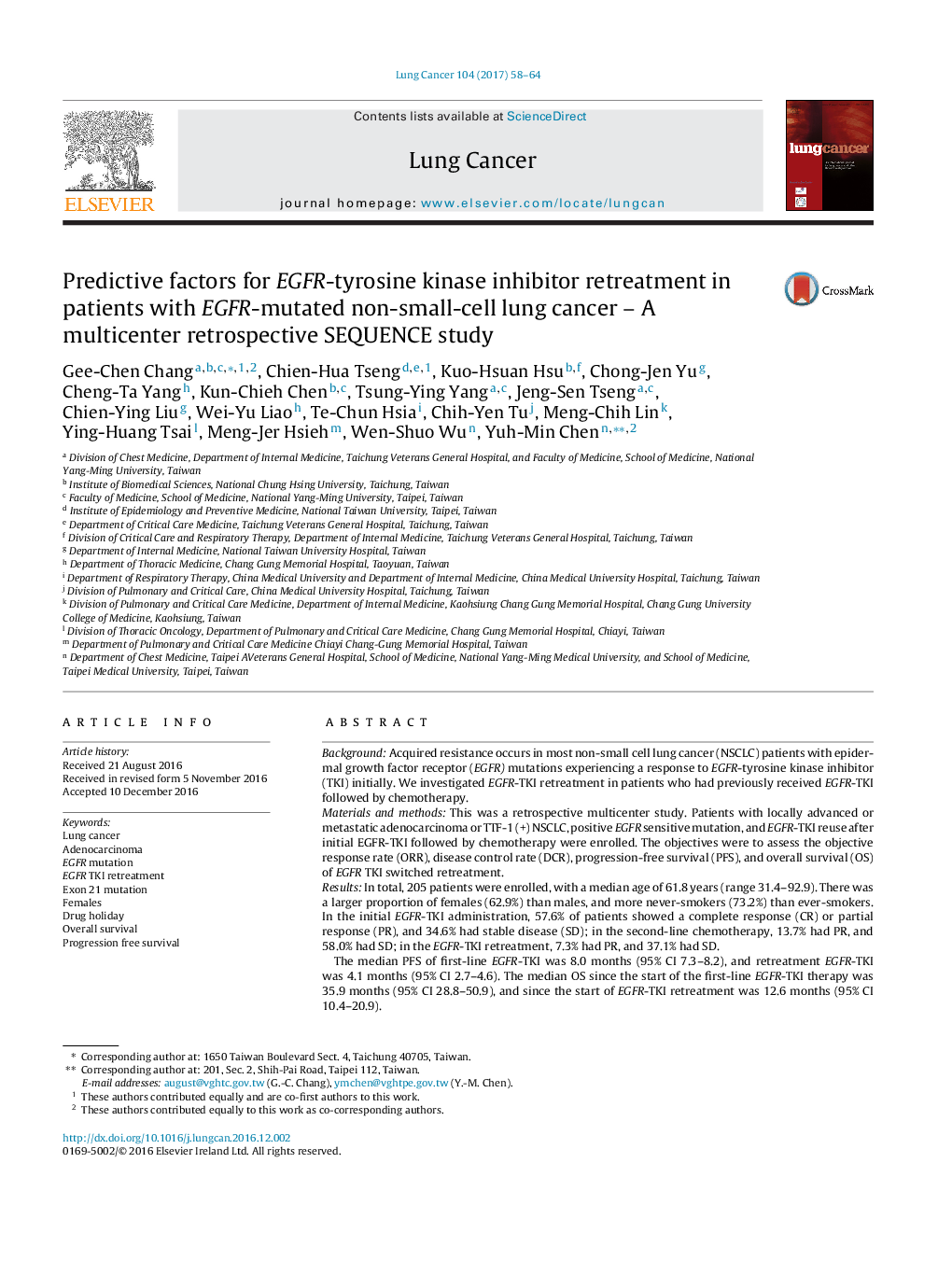| Article ID | Journal | Published Year | Pages | File Type |
|---|---|---|---|---|
| 5528407 | Lung Cancer | 2017 | 7 Pages |
â¢Providing clinical evidence of EGFR-TKI retreatment following chemotherapy.â¢Survival benefit was pronounced in patients with longer drug holidays.â¢Females with exon 21 mutation are most likely to benefit from this strategy.
BackgroundAcquired resistance occurs in most non-small cell lung cancer (NSCLC) patients with epidermal growth factor receptor (EGFR) mutations experiencing a response to EGFR-tyrosine kinase inhibitor (TKI) initially. We investigated EGFR-TKI retreatment in patients who had previously received EGFR-TKI followed by chemotherapy.Materials and methodsThis was a retrospective multicenter study. Patients with locally advanced or metastatic adenocarcinoma or TTF-1 (+) NSCLC, positive EGFR sensitive mutation, and EGFR-TKI reuse after initial EGFR-TKI followed by chemotherapy were enrolled. The objectives were to assess the objective response rate (ORR), disease control rate (DCR), progression-free survival (PFS), and overall survival (OS) of EGFR TKI switched retreatment.ResultsIn total, 205 patients were enrolled, with a median age of 61.8 years (range 31.4-92.9). There was a larger proportion of females (62.9%) than males, and more never-smokers (73.2%) than ever-smokers. In the initial EGFR-TKI administration, 57.6% of patients showed a complete response (CR) or partial response (PR), and 34.6% had stable disease (SD); in the second-line chemotherapy, 13.7% had PR, and 58.0% had SD; in the EGFR-TKI retreatment, 7.3% had PR, and 37.1% had SD.The median PFS of first-line EGFR-TKI was 8.0 months (95% CI 7.3-8.2), and retreatment EGFR-TKI was 4.1 months (95% CI 2.7-4.6). The median OS since the start of the first-line EGFR-TKI therapy was 35.9 months (95% CI 28.8-50.9), and since the start of EGFR-TKI retreatment was 12.6 months (95% CI 10.4-20.9).In the univariable and multivariable regression analysis of factors associated with PFS of EGFR-TKI retreatment, time interval between the two EGFR TKIs equal to or more than 7 months was statistically significant (HR = 0.62, 95% CI 0.44-0.86; HR = 0.6, 95% CI 0.43-0.86), both p < 0.01. Females with exon 21 mutation also showed a significant difference between the two groups (HR = 0.51, 95% CI 0.30-0.86; HR = 0.52 (0.31-0.88), both p < 0.05).ConclusionsEGFR-TKI retreatment was effective in prolonging survival, and was shown to be a worthwhile option for EGFR-mutated NSCLC patients after failure of first-line EGFR-TKI and chemotherapy. The survival benefit was especially pronounced in patients with longer drug holidays from the initial EGFR-TKI and in females with the exon 21 mutation.
